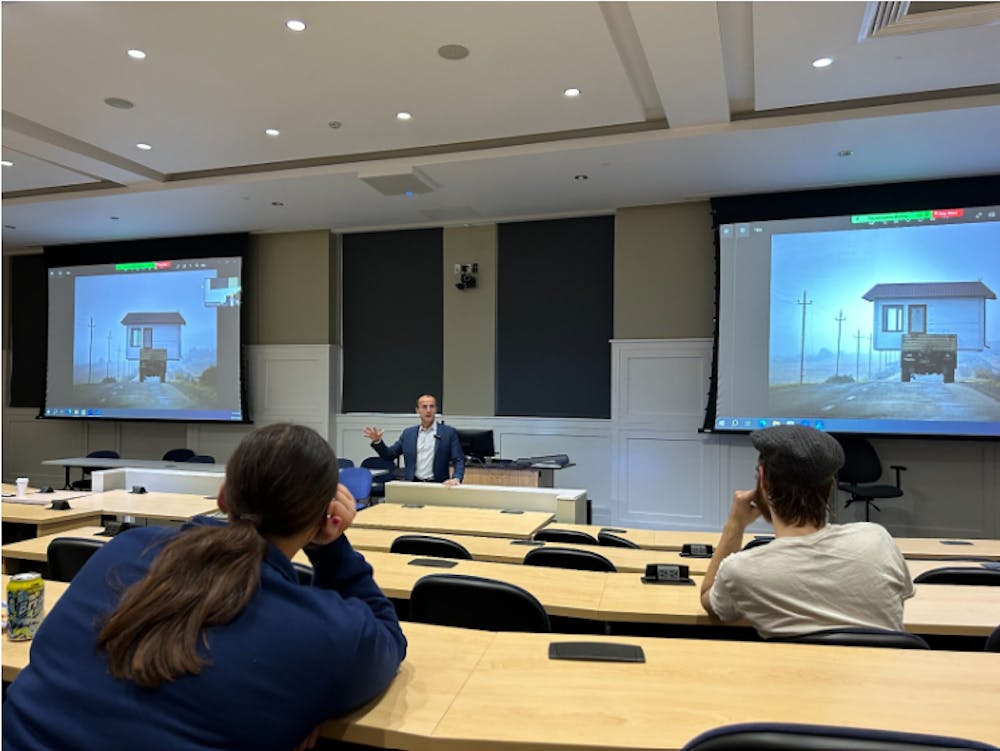By Briana Keenan
Staff Writer
“Uprooted,” “displacement” and “loss” are three words that students at the College used to describe a photo from the Associated Press of a truck driver with a home on the back of their vehicle.
The photo was taken when thousands of Armenians were forced out of their home region in 2020, symbolizing the need to take home with them when they are forced to leave the land.
Armenians were threatened, tortured and exterminated over 100 years ago during the Armenian Genocide that took place during World War I.
The same is occurring today, according to Khatchig Mouradian, a co-principal investigator of the project on Armenian Genocide Denial at the Global Institute for Advanced Study at New York University, who came to the College on Oct. 31 to discuss how to stop the current violence against Armenians, in turn preventing another genocide.
Mouradian is the grandson of Armenian Genocide survivors, and some of his friends were forced to leave Armenia.
“There’s this perfect storm that has been created,” he said in reference to the building conflict.
The media updates the world frequently on the war between Ukraine and Russia and the one between Israel and Palestine, but Mouradian said that others have “very little coverage.”
“There’s barely a blip on the radar,” he said.
Mouradian said that a conflict of this magnitude does not just happen; it takes years of tension for it to build to a breaking point. He shared that the outburst from the Armenian population in the 1980s was met with violence early on, but Armenia ended up winning over Azerbaijan.
“This is the same thing happening all over again,” Mouradian said.
The growing tension has led to an imbalance, which can be seen on a physical and metaphorical level, according to Mouradian. He said that Armenia is smaller in land size and strength in comparison to the perpetrators.
“There is a massive asymmetry of power that is being created,” he said. “We will take back this land; this land belongs to us.”
According to Mouradian, Russia was “one of the key players” in the region and is impacting the ethnic cleansing of the Armenian population. This changed after the war with Ukraine began, because Russia was distracted and lost several of its resources.
“There was a shift,” he said. “Azerbaijan is trying to take advantage of this.”
While they do not have as much of a role in the conflict as Russia and the perpetrators did, the United States and Europe also play a part, according to the investigator.
“The United States mounted a massive humanitarian effort,” he said.
Recently, Azerbaijan blocked the corridor that connects it to Armenia and waited until their resources were depleted, according to Mouradian. Very few Armenians are left in Artsakh and 120,000 were forced to leave in September because they didn’t have anything left to survive, including some of the professor’s friends.
“This is ethnic cleansing,” Mouradian said.
Madison Smith, a senior interactive multimedia major, reflected afterwards on how prior knowledge is crucial in looking to prevent future genocides.
“Knowing about the previous genocide of that area and how it still affects the citizens of Armenia today is key to understanding how unresolved conflicts can survive for hundreds of years,” she said.
Mouradian echoed similar thoughts on advocating for those who do not have as much power to speak up.
“We must magnify voices calling for the end of oppression,” he said.
Presently, Armenia is working to preserve its culture during the time of this conflict, with Mouradian noting the large amount of activism taking place.
Mouradian explained that when they were forced to evacuate, people preserved any items that could have been taken out of the region, such as manuscripts, to hold onto their culture and have a piece of their homeland.
“As a historian who studies past genocides, witnessing mass violence and ethnic cleansing play out in real time, with little political will to stop them, is most jarring,” Mouradian said in a follow-up interview. “We do our best to bring attention to these crimes, and amplify the voices of those who are targeted.”
Although the potential for conflict based on the ethnic cleansing is “very much present,” Mouradian said that Armenians have been sticking together to fight back and prevent another genocide.
“There is a sense of standing despite the scars and the challenges,” Mouradian said.







